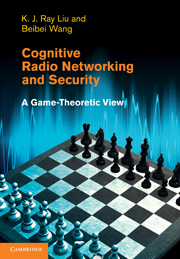Book contents
- Frontmatter
- Contents
- Preface
- Part I Cognitive radio communications and cooperation
- Part II Resource awareness and learning
- Part III Securing mechanism and strategies
- 15 Trust modeling and evaluation
- 16 Defense against routing disruptions
- 17 Defense against traffic-injection attacks
- 18 Stimulation of attack-resistant cooperation
- 19 Optimal strategies for stimulation of cooperation
- 20 Belief evaluation for cooperation enforcement
- 21 Defense against insider attacks
- 22 Secure cooperation stimulation under noise and imperfect monitoring
- References
- Index
19 - Optimal strategies for stimulation of cooperation
from Part III - Securing mechanism and strategies
Published online by Cambridge University Press: 06 December 2010
- Frontmatter
- Contents
- Preface
- Part I Cognitive radio communications and cooperation
- Part II Resource awareness and learning
- Part III Securing mechanism and strategies
- 15 Trust modeling and evaluation
- 16 Defense against routing disruptions
- 17 Defense against traffic-injection attacks
- 18 Stimulation of attack-resistant cooperation
- 19 Optimal strategies for stimulation of cooperation
- 20 Belief evaluation for cooperation enforcement
- 21 Defense against insider attacks
- 22 Secure cooperation stimulation under noise and imperfect monitoring
- References
- Index
Summary
In this chapter we present a joint analysis of cooperation stimulation and security in autonomous mobile ad hoc networks under a game-theoretic framework. We first investigate a simple yet illuminating two-player packet-forwarding game, and derive the optimal and cheat-proof packet-forwarding strategies. We then investigate the secure-routing and packet-forwarding game for autonomous ad hoc networks in noisy and hostile environments, and derive a set of reputation-based cheat-proof and attackresistant cooperation-stimulation strategies. When analyzing the cooperation strategies, besides Nash equilibrium, other optimality criteria, such as Pareto optimality, subgame perfection, fairness, and cheat-proofing, are also considered. Both analysis and simulation studies show that the strategies discussed here can effectively stimulate cooperation among selfish nodes in autonomous mobile ad hoc networks under noise and attacks, and that the damage that can be caused by attackers is bounded and limited.
Introduction
Node cooperation is a very important issue in order for ad hoc networks to be successfully deployed in an autonomous way. In addition to many schemes that have been studied to stimulate node cooperation in ad hoc networks, ARCS was considered in the previous chapter to simultaneously stimulate cooperation among selfish nodes and defend against various attacks.
- Type
- Chapter
- Information
- Cognitive Radio Networking and SecurityA Game-Theoretic View, pp. 468 - 495Publisher: Cambridge University PressPrint publication year: 2010



